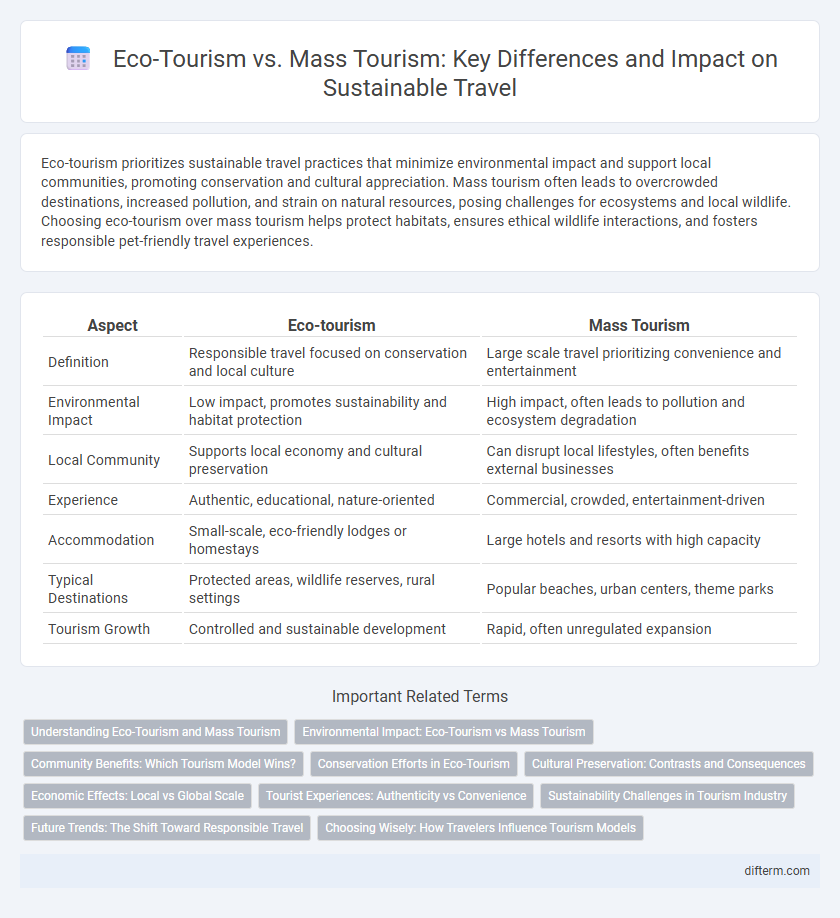Eco-tourism prioritizes sustainable travel practices that minimize environmental impact and support local communities, promoting conservation and cultural appreciation. Mass tourism often leads to overcrowded destinations, increased pollution, and strain on natural resources, posing challenges for ecosystems and local wildlife. Choosing eco-tourism over mass tourism helps protect habitats, ensures ethical wildlife interactions, and fosters responsible pet-friendly travel experiences.
Table of Comparison
| Aspect | Eco-tourism | Mass Tourism |
|---|---|---|
| Definition | Responsible travel focused on conservation and local culture | Large scale travel prioritizing convenience and entertainment |
| Environmental Impact | Low impact, promotes sustainability and habitat protection | High impact, often leads to pollution and ecosystem degradation |
| Local Community | Supports local economy and cultural preservation | Can disrupt local lifestyles, often benefits external businesses |
| Experience | Authentic, educational, nature-oriented | Commercial, crowded, entertainment-driven |
| Accommodation | Small-scale, eco-friendly lodges or homestays | Large hotels and resorts with high capacity |
| Typical Destinations | Protected areas, wildlife reserves, rural settings | Popular beaches, urban centers, theme parks |
| Tourism Growth | Controlled and sustainable development | Rapid, often unregulated expansion |
Understanding Eco-Tourism and Mass Tourism
Eco-tourism promotes sustainable travel focused on conserving natural environments and supporting local communities, often involving low-impact activities like wildlife observation and cultural immersion. Mass tourism, characterized by large groups and high-volume destinations, typically prioritizes convenience and accessibility, sometimes leading to environmental degradation and cultural dilution. Understanding the differences between eco-tourism and mass tourism helps travelers make informed choices that balance enjoyment with environmental responsibility.
Environmental Impact: Eco-Tourism vs Mass Tourism
Eco-tourism significantly reduces environmental degradation by promoting sustainable practices like wildlife conservation and habitat preservation, whereas mass tourism often leads to pollution, resource depletion, and habitat destruction due to high visitor volumes. Eco-tourism encourages minimal carbon footprints through eco-friendly transportation and accommodation options, contrasting with mass tourism's reliance on energy-intensive flights and large-scale infrastructure development. The emphasis on education and local community involvement in eco-tourism enhances environmental awareness, while mass tourism typically prioritizes economic gains over ecological balance.
Community Benefits: Which Tourism Model Wins?
Eco-tourism promotes sustainable development by directly supporting local communities through job creation, cultural preservation, and revenue reinvestment in infrastructure and education. Mass tourism often generates higher immediate economic gains but can lead to resource depletion, cultural erosion, and uneven distribution of benefits within local populations. Community benefits tend to favor eco-tourism as it prioritizes long-term social and environmental well-being alongside economic growth.
Conservation Efforts in Eco-Tourism
Eco-tourism prioritizes conservation efforts by promoting sustainable practices that protect natural habitats and biodiversity. It supports local communities through eco-friendly initiatives, reducing environmental impact compared to mass tourism. Preservation of wildlife and ecosystems remains central, encouraging responsible travel and minimizing ecological footprints.
Cultural Preservation: Contrasts and Consequences
Eco-tourism prioritizes cultural preservation by encouraging respectful interactions with local communities and supporting traditional practices, which helps maintain heritage sites and indigenous knowledge. Mass tourism often leads to cultural commodification and degradation due to large crowds and commercialization, diminishing the authenticity of local customs. This contrast impacts the sustainability of cultural landscapes, influencing long-term community resilience and identity preservation.
Economic Effects: Local vs Global Scale
Eco-tourism fosters sustainable development by generating revenue primarily for local communities, often enhancing small businesses and preserving natural resources. In contrast, mass tourism drives significant global economic gains but frequently causes economic leakage, where profits flow to multinational corporations rather than benefiting local economies. The local economic impact of eco-tourism tends to be more equitable and long-lasting, while mass tourism boosts large-scale infrastructure and employment but risks environmental degradation and cultural dilution.
Tourist Experiences: Authenticity vs Convenience
Eco-tourism offers immersive, authentic experiences by encouraging interaction with local cultures and natural environments, fostering meaningful connections and environmental awareness. Mass tourism prioritizes convenience through pre-packaged tours and standardized amenities, delivering comfort and accessibility but often diluting cultural authenticity. Tourists seeking genuine engagement typically prefer eco-tourism, while those valuing hassle-free travel lean toward mass tourism options.
Sustainability Challenges in Tourism Industry
Eco-tourism emphasizes environmental preservation and supports local communities by minimizing ecological footprints, whereas mass tourism often leads to overconsumption of resources and habitat degradation. Key sustainability challenges in the tourism industry include managing waste, reducing carbon emissions, and protecting biodiversity from the impacts of large tourist influxes. Implementing responsible travel practices and promoting eco-friendly accommodations are critical to mitigating these challenges and ensuring long-term ecological balance.
Future Trends: The Shift Toward Responsible Travel
Future trends in travel indicate a significant shift toward responsible travel, with eco-tourism gaining momentum over mass tourism due to increasing environmental awareness and sustainable practices. Eco-tourism emphasizes low-impact experiences, conservation efforts, and support for local communities, contrasting with mass tourism's tendency for overcrowded destinations and resource depletion. Emerging technologies like carbon tracking apps and AI-driven personalized eco-friendly itineraries further enable travelers to make informed, sustainable choices that minimize their ecological footprint.
Choosing Wisely: How Travelers Influence Tourism Models
Travelers play a crucial role in shaping tourism models by opting for eco-tourism, which emphasizes sustainable practices, local community support, and environmental preservation, over mass tourism that often leads to overcrowding and ecological degradation. By prioritizing eco-friendly accommodations, responsible wildlife interactions, and low-impact activities, travelers help reduce carbon footprints and promote biodiversity conservation. Conscious decisions by travelers drive demand for more sustainable infrastructure and policies, ultimately steering the global tourism industry toward greener, more socially responsible growth.
Eco-tourism vs Mass tourism Infographic

 difterm.com
difterm.com